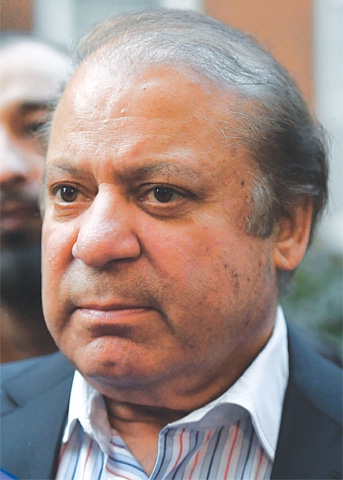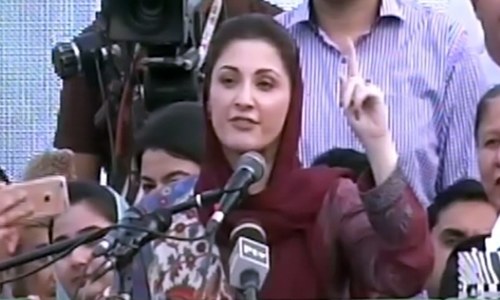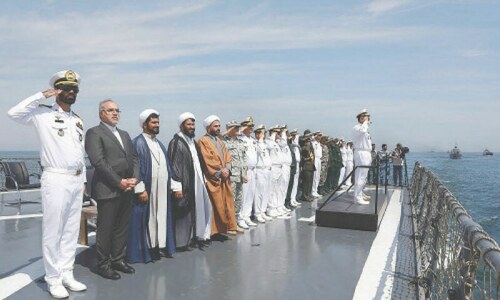
IN the near-term, the judgement changes little or nothing for Nawaz Sharif.
If the National Assembly completes its term on May 31, as seems likely, the next general election will be scheduled for late July. Sharif was disqualified last July and there was no chance that his disqualification would be for a year or less.
Indeed, the most generous argument before the Supreme Court for the application of Article 62(1)(f) to less than a lifetime was for a five-year disqualification.
What the judgement has done, however, is re-focus political debate on Sharif: what is his end goal and where is the strategy to achieve it?
To outsiders, neither seems apparent.
In the longer term, the judgement is certainly a blow to the political future of Sharif. Between his disqualification last July and a declaration that disqualification under Article 62(1) is for a lifetime, the current and several future chief justices of Pakistan have declared Sharif to be ineligible for electoral politics. This before a NAB court has concluded the trial of Sharif and his family.
“Oh, it’s over for him. He does not think he will be PM again,” said Hamid Mir, when asked if Sharif intends to force his way back into front-line, electoral politics.
Shafqat Mahmood of the PTI had a similar view: “This is now a past and closed transaction. You can’t have an NRO with the judiciary.”
The PTI MNA continued: “The real consideration is Maryam, his legacy and the properties abroad,” suggesting that changes in UK law may make it possible for Pakistan to try and claw back assets located abroad if an NAB conviction follows.
Among PML-N hawks, the view is predictably different. “I thought it’s apparent,” said a senior PML-N leader when asked what Sharif’s legal-political strategy is. “The strategy is simple: we have legal and political recourse. Will continue to reach out to the people with our narrative. If there’s a free and fair electoral process, people of Pakistan will overwhelmingly vote for PML-N. If that happens, the parliament can take decisions whatever it decides.”
The senior PML-N leader, among others in the PML-N, spoke on the condition of anonymity because of concerns about contempt of court charges in the current political environment.
Each suggested that just as a politicised process case against Nawaz has unfolded in the courts, when Sharif’s and the PML-N’s political fortunes change, court declarations may be reversed.
Suhail Warraich, an expert on Punjab politics, concurred: “He (Nawaz) is gaining time just to see changes in judiciary and military or some international upheaval.”
The implication being that while Sharif does not see an immediate path back to electoral politics, he is focused on the longer term, where national or geopolitical changes could be more favourable to Sharif.
A picture being circulated by the PML-N reinforces that view. The picture is of the front page of Jang newspaper on July 23, 2000. The headline screams: ‘14 years prison, 2 crore rupees fine, 21 years disqualification’ for Sharif in the so-called helicopter case.
Yet, even as Sharif continues to barnstorm the country to significant political success, gathering major crowds across Punjab and, notably, in Peshawar, the legal vice in which he is caught has undeniably tightened. A lifetime disqualification by the Supreme Court means no further participation in electoral politics.
If Sharif had hoped to sit out the next parliamentary term, just as he did between 2008 and 2013, and return to politics in 2023, that door too has now been closed.
Meanwhile, if the PML-N’s aim is to win a two-thirds majority in the National Assembly with the support of allies to change the Constitution, a two-thirds majority in the Senate — required to amend the Constitution — is virtually insurmountable after the recent debacle in the Senate.
Outside Sharif’s core circle, then, the relentless legal pressure on Sharif combined with Sharif’s relentless campaigning has only one logical answer: Sharif is fighting for the political future of his daughter and his own political legacy.
“Disqualification does not mean he has to leave politics altogether,” said Hamid Mir. “If he (Nawaz) can’t be prime minister again, then doesn’t mean it’s completely over. There’s still Maryam and who knows what the future may bring.”
There may though be one clear, skin-in-the-game measure in the days ahead of which way Sharif’s political fate has tilted after yesterday’s Supreme Court judgment: defections from the PML-N. With only weeks until a caretaker government assumes charge, the pressure on candidates to declare affiliations and pick sides ahead of the general election will be intense.
That, then, could be Sharif’s first order of business after yesterday’s judgment: convincing his own party that standing by him is in their and the party’s interest.
After yesterday, the task may have become just a little bit harder.
Published in Dawn, April 14th, 2018
















































